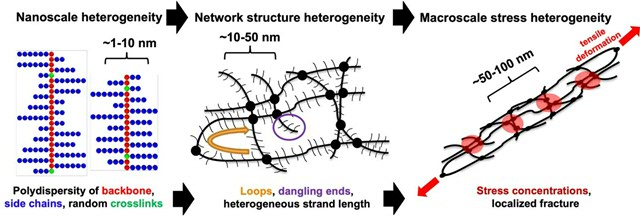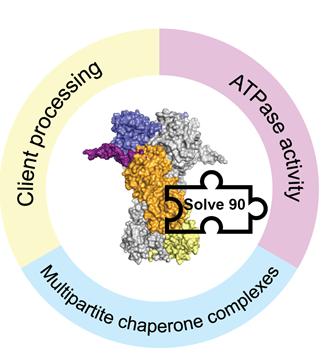Twee Open Competitie ENW-M-subsidies voor FSE-onderzoekers
Dr. Andrea Giuntoli van het Zernike Institute for Advanced Materials en dr. Kasia Tych van het Groningen Biomolecular Sciences and Biotechnology Institute (GBB) hebben een Open Competitie ENW-M-subsidie ontvangen van de Nederlandse Organisatie voor Wetenschappelijk Onderzoek (NWO). Giuntoli ontvangt een M1-subsidie subsidie ter waarde van 350.000 euro voor zijn project ‘ Betere ultra‐zachte elastomeren door beheersing van defecten’. Dr. Kasia Tych en dr. Sonja Schmid van de Wageningen University & Research (WUR) (coördinator) ontvangen samen een M2-subsidie ter waarde van 700.000 euro. Hun project heeft als titel ‘ Doorgronden van de meester-chaperonne van onze cellen’.
M-subsidies zijn bedoeld voor innovatief, kwalitatief hoogwaardig fundamenteel onderzoek en/of studies met wetenschappelijke urgentie.
Betere ultra‐zachte elastomeren door beheersing van defecten | dr. Andrea Giuntoli (Zernike Institute for Advanced Materials)
Defecten in materialen zijn niet alleen onvermijdelijk, ze kunnen ook slim worden ingezet om mechanische eigenschappen te verbeteren. Dit project is geïnspireerd op deze gedachtengang voor een nieuwe klasse van ultra-zacht rubber bestaande uit een ge-crosslinkt netwerk van bottlebrush (flessenrager) polymeren. Deze materialen bevatten imperfecties op diverse lenteschalen, maar het is niet bekend hoe deze verscheidenheid invloed heeft op de uiteindelijke materiaaleigenschappen. Met defect engineering als einddoel, worden in dit project diverse grootschalige computer simulaties gebruikt, die aangevuld met machine learning algoritmes inzicht gaan verschaffen in de rol van multischaal defecten op de mechanische eigenschappen van bottlebrush polymere netwerken.

Doorgronden van de meester-chaperonne van onze cellen | dr. Katarzyna Tych (GBB) en dr. Sonja Schmid (WUR)

Eiwitten vormen de moleculaire machines in onze cellen. Veel eiwitten zouden echter niet functioneel zijn zonder de cellulaire hoofdchaperonne, Hsp90, die ze tot daadwerkelijk functionele entiteiten omvormt. Verrassend genoeg begrijpen we ondanks intensief onderzoek naar deze centrale rol nog steeds niet hoe Hsp90 eigenlijk werkt. Schmid en Tych gaan daarom nieuwe technologie gebruiken om individuele Hsp90 moleculen te doorgronden. Zij zullen testen hoe Hsp90 energetisch wordt aangedreven, hoe het andere eiwitten behandelt en hoe Hsp90 noodzakelijke helper-eiwitten coördineert. Het onderzoek zal momenteel ontbrekend moleculair begrip van Hsp90 opleveren en zo de ontwikkeling van kankertherapieën stimuleren.
NWO Open Competitie ENW-M
M-subsidies zijn bedoeld voor het realiseren van nieuwsgierigheidsgedreven, fundamenteel onderzoek van hoge kwaliteit en/of wetenschappelijke urgentie. De subsidie biedt onderzoekers de mogelijkheid om creatieve en risicovolle ideeën uit te werken en wetenschappelijke innovaties te realiseren die de basis kunnen vormen voor de onderzoeksthema's van de toekomst.
Meer nieuws
-
29 januari 2026
Microplasticonderzoek - opgeblazen nieuws of een echt gevaar?
-
27 januari 2026
ERC Proof of Concept grant voor Maria Loi
